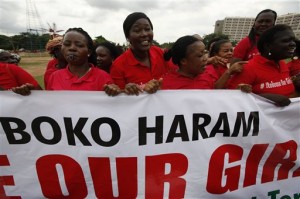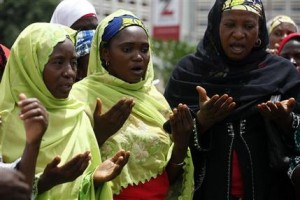The recent kidnappings of more than 300 school girls in Nigeria have prompted some Utah citizens to take action, just as Nigeria’s leader vowed on Thursday to “do everything possible to bring our daughters home.”
Brittany Plothow, a nonprofit activist and founder of the organization “We Are One in Three,” was watching a Google Hangout when she learned of the kidnappings. Plothow, whose organization works with survivors of sexual assault, felt that she needed to do more than just watch the news.

“I feel like culture, especially in Utah County, is very passive. I’m in Utah and the news is over there, so there isn’t anything I can do about it,” Plothow said.
Plothow, along with many other Utah residents, organized a rally outside the Utah State Capitol on Saturday, May 10, to raise awareness of the troubling situation faced by the kidnapped girls. She believes Utah residents have more of an influence than they may realize.
“These girls are my sisters. I am not only a Utah citizen, but a citizen of the entire planet. The point of living is to make life better for other people. If that requires me to rally outside the Utah capitol, then so be it. You have so much power to do bigger and better things, even if you never see the effects from it.”
According to Plothow, Utahns need to be more open to having conversations that will bring about change.
“Figure out what you can do in your sphere of influence to make a difference. You can talk about it, raise awareness, and eventually word will reach people who have the power to do something,” Plothow said.
Some in Utah have taken initiative on the issue. On May 24, several members of the Utah Nigerian Association rallied outside the Utah State Capitol to encourage legislators to “bring our girls back” safely. The Nigerian Association of Utah is a 501(c)(3) nonprofit organization that partners with other organizations and raises funding to improve the living conditions in Nigeria.
Andy Iheanacho, who grew up in Nigeria and serves as president of the Utah Nigerian Association, encourages Utahns to focus on the recent events in Nigeria.
“Nigeria is one of those areas that we living in Utah should not take for granted. We cannot turn our back. We need to have open dialogue and educate ourselves in an effort to help promote international cooperation,” Iheanacho said.
According to Leslie Hadfield, an assistant professor of history at BYU, however, the solution to the challenges in Nigeria can only be provided by the Nigerian people.
“There is an underlying view that Africans cannot do things themselves. We need to give them more credit. The Nigerians are the ones who are really bringing (the kidnappings) to the attention of international governments. The Nigerian government has its issues, but these are things that only Nigerians can fix.”

However, according to Hadfield, the solution is not as simple as getting Nigerians to rally. “We often simplify Africa and think it’s this homogeneous place,” Hadfield said. “Nigeria is an extremely diverse place. It ranks eighth in the world in population. The country is comprised of more than 30 states, 250 or more ethnic groups and more than 500 languages. … We expect these diverse people to just work together. We need to understand that we live in a different place.”
Hadfield continued to expound on the problem Nigeria will need to surmount in order to work through such issues as the kidnappings: “We expect these countries to work together, with all of these diverse people, and expect them to simply have a democracy when we have been practicing democracy for over 200 years.”
Nigerians are taking a role in petitioning the government to take action, however. Nigerian schools have closed in protest of the kidnappings in an attempt to pressure Nigerian President Goodluck Jonathan, as well as other Nigerian government officials, to take a more active role to help the Nigerian population.
According to the Associated Press, the kidnappings are the work of Boko Haram, a foreign terrorist organization that has been linked to the Al-Qaeda terrorist network. The U.S. has deployed 80 military personnel to Chad to help locate the girls.
Nigerian government officials are being criticized for their slow response to the kidnappings, which has prompted a response from the international community. The girls and young women, all from a school in northern Nigeria, were kidnapped from their dormitories on April 15.




